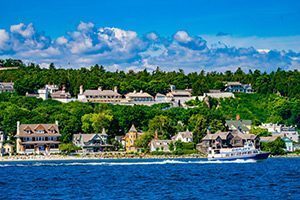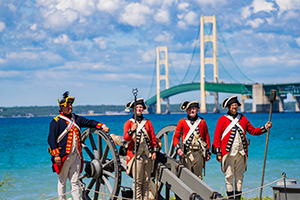Private James Brown entered the mess room of the Soldiers’ Barracks at Fort Mackinac the evening of December 5, 1828. A loud blast filled

the room and Corporal Hugh Flinn fell to the floor, bleeding from his neck. The fifteen witnesses in the room saw Pvt. Brown lower a musket to his hip and exclaim, “My God, what have I done?”

There was never any question that Pvt. Brown killed Cpl. Flinn on that December day – he admitted that much. However, he always maintained it was an accidental shooting; no intent and the gun went off accidentally. Brown was kept in the fort’s guardhouse for murder until July 1829 when he was handed over to civil authorities on Mackinac Island under Sheriff Edward Biddle. Judge James Doty was the U.S. Circuit Court judge for Michilimackinac, Brown, and Crawford counties and came to the island in July when Brown entered his innocent plea. After hearing testimony, the grand jury decided to take the case to trial.
The juried trial was held on Mackinac Island. No soldier had actually seen Brown shoot Flinn, just the aftermath. After both sides made their case, the jury came to the conclusion of guilty and Doty sentenced Brown to hang. An appeal was made on the grounds that some members of the jury had not paid tax. When no able jury was found in the county, the venue was changed to Green Bay in Brown County. Biddle and Brown traveled by canoe to Green Bay for the second trial. Brown again was found guilty and sentenced to hang.
One last effort to save Pvt. Brown was to ask for a presidential pardon. Territorial Governor Lewis

Cass informed Biddle he extended Brown’s execution date until February so the mail could get to President Jackson in time for a pardon. Reverend William Ferry, of the Mackinaw Mission and Mission Church on the island, visited Brown often. He ministered to him in hopes for a conversion before his execution, but Brown resisted. In January, word was received that Brown’s pardon was not granted. It was Rev. Ferry who delivered the news.

The hanging was to take place downtown on Mackinac Island between 10:00 a.m. and 2:00 p.m. on February 1, 1830. Sheriff Edward Biddle was to preside. There was talk of a gathering of townsfolk. The location of the hanging, who observed this event, and if there was any social gathering, remains a mystery. The hanging of Pvt. Brown was only one of 13 death penalty actions in the state and territory of Michigan. Michigan abolished all death penalties for murder in 1846.









